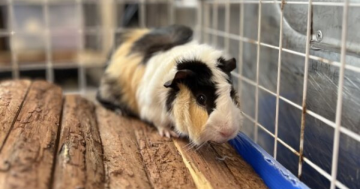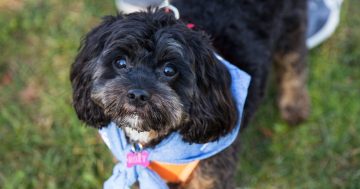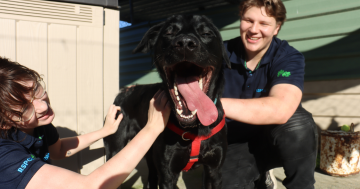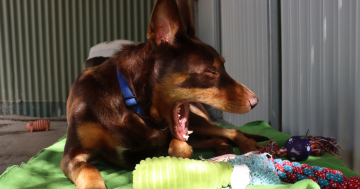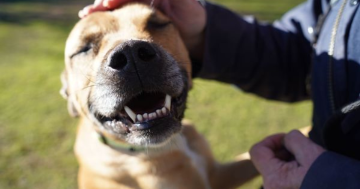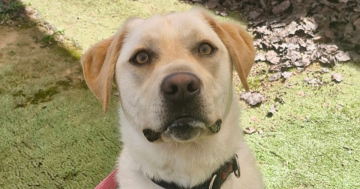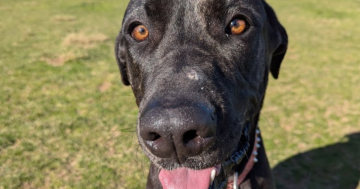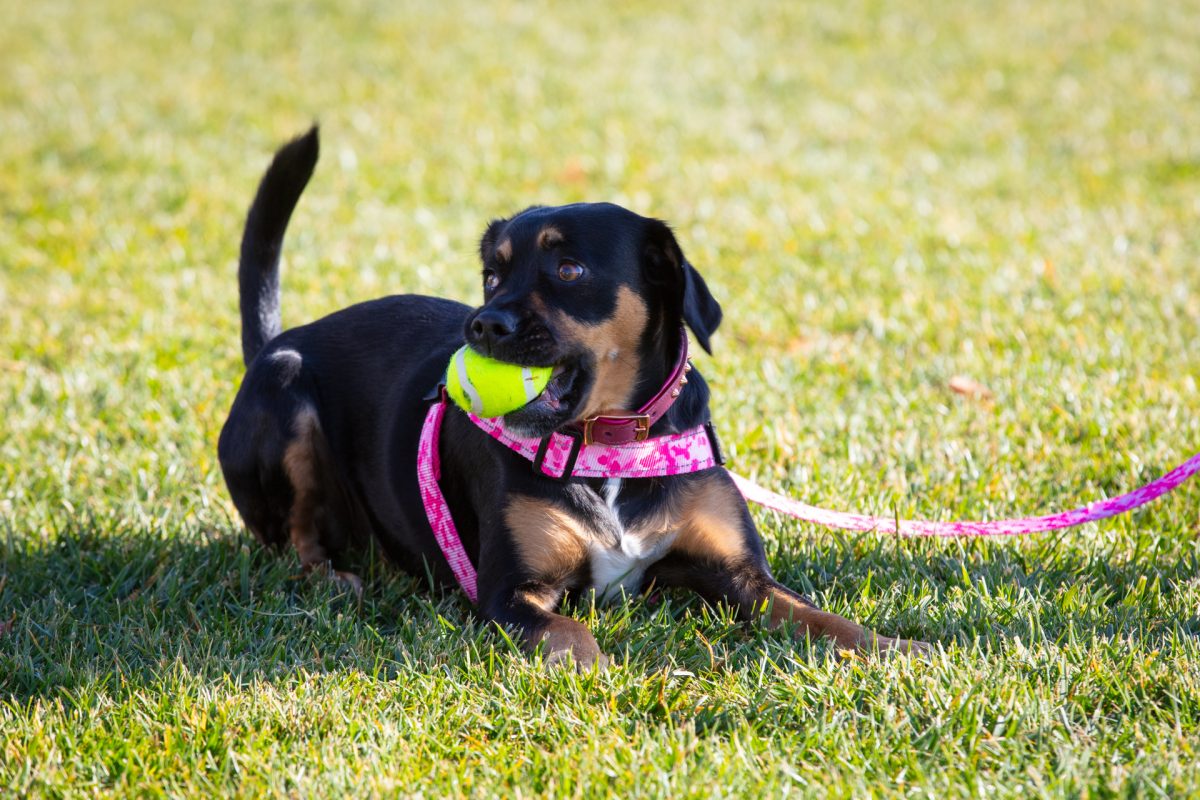
Looking for a dog trainer? Read through our list of some of Canberra’s most recommended. Photo: Thomas Lucraft.
From poodles in Page to pugs in Parkes, Canberra is home to many beloved four-legged companions. And what is not to love? Their gentle nature, playfulness, and endless affection sees the humble hound top the list as Australia’s favourite household pet.
That said, if you have ever had to deal with dowdy dog behaviour you will know how frustrating it can be. Endless barking, incessant jumping, and a world-wide toilet can make even the most experienced owner restless. Not to mention socialising with family, and dare I suggest other dogs?
Whatever the age or stage of your darling dog, I am sure that they (and you!) could benefit from some helping hands. This is where an experienced dog trainer can make the world of difference. Dog trainers are masters of behavioural modification. They use their knowledge of breed-based characteristics and an observant eye to vastly improve the nature of dogs.
And that’s not all. A well-trained dog reaps the emotional, physical, and mental benefits that comes with this type of stimulation. So, if mechanical, environmental, or reward lead training seems like too much just remember your dog will be better for it.
So where does one start? The good news is that we’ve shortlisted the best dog trainers that Canberra has to offer a mere few scrolls below.
What makes a great dog trainer?
Great dog trainers are canine lovers possessing a natural affinity with all breeds great and small. They are masters of behavioural training and can make even the most obnoxious pup a sheer delight. Here is what we think makes a great dog trainer:
- Natural affinity with dogs. The best professional dog trainers are truly passionate about our furry four-legged friends. This is so important as effective dog training requires a deep understanding of natural dog behaviours, abilities, and habits. Without this insight getting the right outcome can be quite difficult indeed.
- Qualified & experienced. Your dog’s wellbeing is never something that should be left in the hands of amateurs. When searching for the perfect trainer always prioritise qualifications and experience. While formal qualifications are not mandatory, they are most certainly advantageous. Look for a certificate III in Dog Training and Behaviour or a certificate IV in Companion Animal Services. Another good measure of your trainer is membership with peak industry body, the National Dog Trainers Federation.
- Positive methods. Let’s be honest; dog training is not exactly play time for your pooch. While great dog trainers make it as fun as possible, training can be laborious work for your dog. Learning new things is challenging, and the lengthy sessions may make it hard for your dog to concentrate. Positive training methods seek to reward dogs for exhibiting the correct behaviours, and encourages future displays.
- Observant. Much like us humans, no two dogs are ever the same. Their temperament and overall nature differs by breed, age, and from one dog to another. As such, careful and considered observation is needed to assess each dog and their individual needs. An observant dog trainer will effectively read your dogs cues and tailor techniques to ensure they yield the best response. Dog training is by no means a one size fits all approach, so seek a trainer that uses observation to their advantage.
- Compassionate. Certainly, all great dog trainers possess compassion in spades. This intuitive empathy ensures that a dog’s needs are always first and foremost in the mind of their trainer. Working at a lightspeed pace or pushing a dog too hard can have disastrous results. Equally, many dogs may come with predisposed anxiety or fear which needs to be treated carefully. A sensitive approach to communication and training all help to achieve the right outcomes.
The best dog trainers in Canberra
RiotACT’s editorial team has combed through 20 years of on-site comments to compile a list of the most recommended businesses according to you.
To be listed in our Best of Canberra series, each business needs to have consistently received positive feedback on RiotACT and Facebook as well as maintaining a minimum average of 4/5 stars on Google.
RSPCA ACT
The RSPCA ACT runs a dog and puppy training school, committed to the education, welfare and training of pet dogs and their owners. RSPCA qualified instructors use force-free, rewards-based training and aim to build strong foundations of trust, respect and consistency.
Training courses, which cover puppies and dogs of all ages, include puppy socialisation, puppy basics, adult basics and senior basics.
Group training is designed for dogs of different ages and abilities. They’re limited to a maximum of eight dogs per course, so participants and dogs receive more individual help and attention.
RSPCA ACT training focuses on manners, impulse control, confidence building, how to sit, drop, how to walk with a loose lead and how to introduce dogs to each other. It provides owners with the skills to foster a fulfilling relationship with their dogs.
Wayne Capper wrote on Google, “The people are awesome and the service they provide is second-to-none and absolutely vital to our community.”
Bow Tie Dog Training
Bow Tie Dog Training is passionate about providing quality services to owners and their dogs—private one-on-one training, group walks and dog sitting. With training, Bow Tie supports obedience and behavioural issues. Group walks are perfect for exercise and socialising (hikes vary in difficulty and length). Dog sitting is at client homes and includes a walk and plenty of pats.
On Google, Pennie Culpan wrote, “Highly recommend Bow Tie Dog Training … super knowledgeable, helpful, and really cares about animal (and human) clients.”
The ACT Companion Dog Club
The ACT Companion Dog Club is a not-for-profit organisation run by volunteers who are passionate about dogs and improving dog behaviour. They offer comprehensive obedience and behaviour training, as well as a raft of activities from fly ball to dancing and more.
The team champions positive training methods to reshape behaviours in healthy and supportive ways. Suitable for pooches young and old, their training and sports classes will transform a mischievous dog into the perfect four-legged companion.
As Bashir Muhammad said on Google, “It's a good place to train your dog friend to make them a better family member.”
There’s a lot that comes with providing the best care for your pet. Check out our articles on the best dog groomers, the best vets, the best emergency after-hours vets, and the best pet shops and pet supplies for more helpful information on Canberra’s best pet services!
If you’re interested in finding somewhere for your pet to stay whilst you’re away, our articles on Canberra’s best dog walkers and pet sitters and best dog boarding kennels and catteries may be helpful.
Finally, if you’re looking to adopt another furry friend, our article on the best places for rescue dogs in Canberra may be of interest to you.
Your experience with dog trainers in Canberra
Thanks to our commenters who have provided insightful feedback. If you believe we have got it wrong, please let us know.
Have you had experience with any of the dog trainers listed above? If so, share your feedback in the comments below.
Frequently Asked Questions
What does a dog trainer do?
A dog trainer is an animal care professional who works with dogs and their owners to teach dogs to obey their owner’s commands and exhibit appropriate behaviour. Aside from obedience, dog trainers can at times also provide specialised training in other areas such as working with livestock, search and rescue, law enforcement, and protection.
Is it worth getting a dog trainer?
Dog trainers can be incredibly helpful for dogs of all ages and at all stages. Whether you are faced with challenges mastering basic commands or behavioural issues such as aggression a dog trainer can help. If you are finding your dog’s behaviour challenging it might be worth consulting with a trainer to assess opportunities for improvement and the development of a training plan.
What age should dog training start?
Dog training should start from the minute you bring your beloved pet home. Many experts agree that earlier is best, with most puppies being able to start formal training from as little as 7-8 weeks of age.
What do dogs learn in training classes?
While not all training classes are the same, you can expect to see a few fundamentals in each course offered by a trainer. These include things like communication, toilet training, handling, biting or jumping, socialisation, and obedience. If in doubt, contact your local dog trainer for a broader discussion on your dog’s needs.
How often should I train my puppy?
To kick start your pups behavioural and social skills formal training can certainly help. Many dog trainers offer courses from as little as once a week for 4-8 weeks. This can be enhanced with daily reinforcement at home for 10-15 minutes or spread out in 5-minute increments. Each dog will of course have different needs so the above is merely a guide only. Speak to your dog trainer for advice on your pup.















